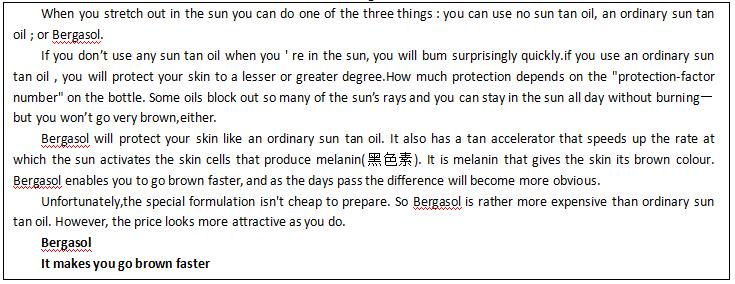2016年成人高考全国统一考试专升本英语真题试卷
Passage One
Alexia Sloane, a 10-year-old girl, lost her sight when she was two following a brain disease.But despite her disability she has excelled at languages and is already fluent in English, French,Spanish and Chinese-and is learning German.
Now she has experienced her dream job of working as an interpreter after East of England MEP(殴盟议员 ) Robert Sturdy invited her to the parliament building in Brussels , thus becoming the youngest interpreter to work at the European Parliament.
" She was given a special permit to get into the building, where there is usually a minimum age requirement of 14, and sat in a booth listening and interpreting, " said her mother. Isabelle. "The other interpreters were amazed at how well she did as the debate was quite complicated and many of the words were rather technical. "
Alexia has been tri-lingual since birth as her mother, a teacher, is half French and half Spanish, while her father, Richard, is English. She started talking and communicating in all three languages before she lost her sight but adapted quickly to her blindness. By the age of four, she was reading and writing in Braille(盲文). When she was six, Alexia began to learn Chinese. The girl is now learning German at school in Cambridge.
Alexia has been longing to be an interpreter since she was six and she chose to go to the European Parliament as her prize when she won a young achiever of the year award. She asked if she could shadow interpreters and Mr. Sturdy agreed to take her along as his guest.
Alexia worked with the head of interpreting and had a real taste of life in parliament. "It was fantastic and I' m absolutely determined now to become an interpreter, " she said.
36. What does the passage tell about Alexia Sloane?
A. She is very proud of her parents. B. She has learned five foreign languages.
C. She is a quick learner of languages. D. She has difficulties with language learning.
37. Why did Alexia need special permission to enter the parliament building?
A. She was not in a state of good health.
B. She could not afford the admission fees.
C. She did not meet the age requirement.
D. She did not have an adult to accompany her.
38. What did Alexia want to do after she got the award?
A. To travel to other European countries.
B. To visit the European Parliament.
C. To apply for a position in the government.
D. To study German at Cambridge University.
39. The tone of the passage can be best described as .
A. critical B. admiring
C. understanding D. doubtful
Passage Two
Generations of Americans have been brought up to believe that a good breakfast is essential to one' s life. Eating breakfast at the start of the day, we have been told, and told again, is as necessary as putting gasoline in the family car before starting a trip. But for many people, the thought of food as the first thing in the morning is never a pleasure. So despite all the efforts, they still take no breakfast.
Between 1977 and 1983. the latest year for which figures could be obtained, the number of people who didn't have breakfast increased by 33% —from 8.8 million to 11.7 million—according to the Chicago-based Market Research Corporation of America. For those who dislike eating breakfast, however, there is some good news.
Several studies in the last few years have shown that. for adults especially, there may be nothing wrong with omitting breakfast. " Going without breakfast does not affect work," said Arnold E. Bender, former professor of nutrition at Queen Elizabeth College in London, “nor does giving people breakfast improve work. " Scientific evidence linking breakfast to better health or better work is surprisingly inadequate (不充分的) , and most of the recent work involves children, not adults. "The literature, says one researcher, Dr. Earnest Polite at the University of Texas, "is poor.
40. Which of these is mentioned in the second paragraph?
A. The number of the people who skip breakfast has increased.
B. Many people fill their cars with gasoline in the morning.
C. 8.8 million people got involved in a study on eating habits.
D. A company carried out a research in 1983.
41. Which is closest in meaning to the underlined part?
A. Having breakfast does not improve work, either.
B. Giving people breakfast improves work.
C. Going without breakfast can improve work, too.
D. Having breakfast does improve work.
42. What does the word "1iterature" in the last sentence refer to?
A. Modern American literature. B. Any printed materials.
C. Written works on a subject. D. Stories, poems and plays.
43. Which of the following statements best summarizes the writer' s conclusion about the function of breakfast?
A. Omitting breakfast helps improve work.
B. Eating breakfast is absolutely necessary.
C. Scientists have produced sufficient evidence in support of breakfast.
D. There isn't strong evidence to prove that breakfast is a must.
Passage Three


44. What can we learn from the second advertisement?
A. It is easy to get a suntan in summer. B. Suntan is regarded as a sign of protection.
C. Sunlight could make one look older. D. Everyone wants to get a suntan from holiday.
45. Why is Solex suitable for everyone?
A. Its price is more attractive. B. It can be used to relieve sunburn.
C. It can make the skin cells more active. D. It has a mild protection factor.
46. Compared with Solex , Bergasol .
A. helps one go brown more quickly B. better protects one ' s skin
C. is more competitive in price D. is a better sun tan oil
47. What is the most attractive feature of Solex Cover-up?
A. It helps one get a more beautiful tan.
B. It is often on sale in supermarkets.
C. It blocks out more sun ' s rays than other oils.
D. It helps one tan gradually and gently.
感谢您阅读2016年成人高考全国统一考试专升本英语真题试卷,本文出自:诚为径成考网,转载需带上本文链接地址:https://chengkao.cwjedu.com/yingyu/682/p2
-
 温馨提示:
温馨提示:
- 因考试政策、内容不断变化与调整,诚为径教育网站提供的以上信息仅供参考,如有异议,请考生以权威部门公布的内容为准!








